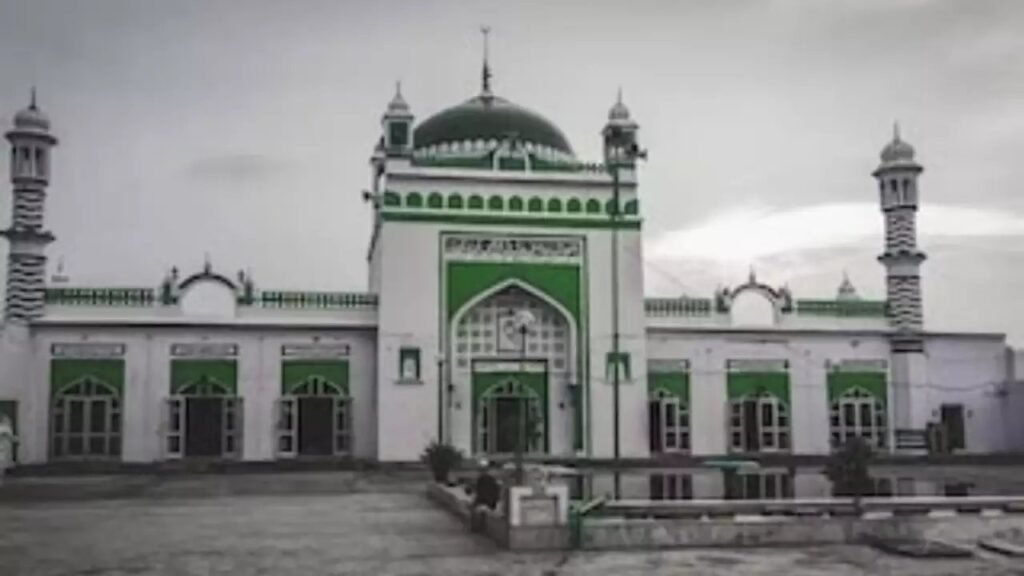The court orders the survey barely three hours after a Hindu priest filed an application claiming that the mosque was built after demolishing a temple
Team Clarion
SAMBHAL – Hours before Wednesday’s polling in the crucial by-elections in Uttar Pradesh, a court suddenly ordered a survey of the historic Jama Masjid in Sambhal district. The court order came on a petition claiming that the mosque was built after razing an ancient temple. The undue haste shown by the court in ordering the survey has drawn widespread outrage and created tension in the area.
On Tuesday, barely three hours after a Hindu priest filed an application in the court claiming that the mosque was built after demolishing a temple, Civil Judge (Senior Division) Aditya Singh ordered an initial survey at the mosque site. The court also directed that a report of the survey should be filed by November 29.
Advocate commissioner Ramesh Raghav and a special team and local officials reached the site for the survey within hours of the court order.
As reports of the survey spread, a large number of Muslims gathered at the mosque. Shops belonging to both the minority and majority communities were shut down and people living nearby areas climbed onto their rooftops. Noticing tension, the local administration deployed a large posse of police and Provincial Armed Constabulary personnel in the area.
The mosque imam was asked by the administration to use loudspeakers to urge the people to maintain peace and communal harmony. Rishi Raj Giri, the mahant of the Kalki Devi temple, who has moved the court, was not allowed to go inside the mosque with the survey team because of the palpable tension.
Addressing reporters, Sambhal MP Zia Ur Rahman Barq said that they have objections to the fact that the court order was issued without serving any notice to members of the mosque committee.
Asserting that it was a mosque and will remain a mosque, Barq said: “Outsiders have attempted to disturb the communal harmony of the district by moving a petition of such nature in the court. The apex court has already directed that as per the Places of Worship Act 1991, all religious places that existed in 1947 will remain at their places. The Jama Masjid has been a historical place of worship for Muslims for several centuries and hence no attempt should be made to challenge its existence. We have the right to move the high court if we are not satisfied by the directive of the local court.”
Jafar Ali, counsel for the mosque side, said the survey was conducted hurriedly despite there being time till November 29 to complete it. “We will challenge the local court verdict in the high court, if need be,” he said.
Meanwhile, the survey of the mosque has come under criticism from Muslim leaders and activists.
Maulana Mahmood Madani, President of Jamiat Ulama-i-Hind, expressed grave concern and criticised the growing trend of targeting mosques under fabricated historical narratives, stating that such actions are undermining the secular foundations of the nation and creating discord among the people of the country.
“The nation continues to suffer from the deep wounds of the Babri Masjid’s demolition. To avoid repeating such painful incidents, the Places of Worship (Special Provisions) Act, 1991, was enacted to safeguard the religious character of all places of worship as they stood on August 15, 1947. Even the Supreme Court, in its Ayodhya verdict, emphasised the significance of this law. However, it is alarming to see this legislation being disregarded in recent judicial actions,” he said.
Maulana Madani pointed out the pattern of creating disputes over mosques, seeking judicial permission for surveys in the name of “uncovering the truth,” and then using the findings to deepen divisions between communities. “Such actions not only weaken national unity but also provide divisive forces with opportunities to harm social harmony,” he said.
Zafarul Islam Khan, former chairman of the Delhi Minority Commission, slammed the survey describing the temple claim as a “myth” and “concocted drama”.
“16th century mosque in Sambhal now claimed to be a temple! Court ultra-quick to order “survey”… Another myth, another target. How will there be peace and harmony in this country if this concocted drama continues all over the country,” he asked.

